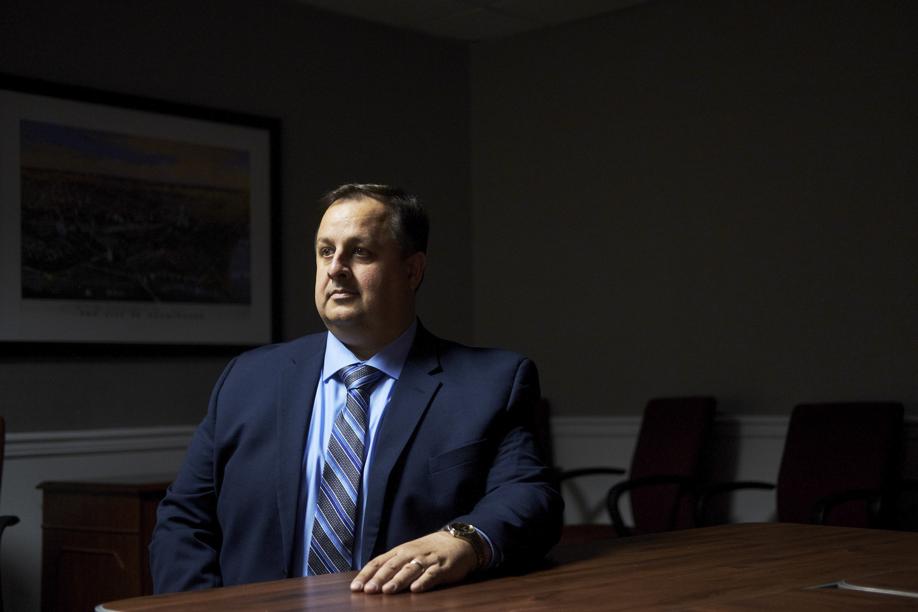
WASHINGTON — Actions by President Trump and his administration have created a historic ethics crisis, the departing head of the Office of Government Ethics said. He called for major changes in federal law to expand the power and reach of the oversight office and combat the threat.
Walter M. Shaub Jr., who is resigning as the federal government’s top ethics watchdog Tuesday, said the Trump administration had flouted or directly challenged long-accepted norms in a way that threatened to undermine the United States’s ethical standards, which have been admired around the world.
“It’s hard for the United States to pursue international anticorruption and ethics initiatives when we’re not even keeping our own side of the street clean. It affects our credibility,’’ Shaub said in an interview this past weekend. “I think we are pretty close to a laughingstock at this point.’’
Trump spent the weekend at a family-owned golf club that was being paid to host the US Women’s Open tournament.
Shaub called for nearly a dozen legal changes to strengthen the federal ethics system: changes that, in many cases, he had not considered necessary before Trump’s election. Every other president since the 1970s, Republican or Democrat, worked closely with the ethics office, he said.
A White House official dismissed the criticism, saying Sunday that Shaub was simply promoting himself and had failed to do his job properly.
“Mr. Schaub’s penchant for raising concerns on matters well outside his scope with the media before ever raising them with the White House — which happens to be his actual day job — is rather telling,’’ Lindsay E. Walters, a White House spokeswoman, said in a statement that misspelled Shaub’s name.
“The truth is, Mr. Schaub is not interested in advising the executive branch on ethics,’’ the statement said. “He’s interested in grandstanding and lobbying for more expansive powers in the office he holds.’’
Trump’s repeated trips to his family’s business properties — he has visited one of them on at least 54 days since moving into the White House nearly six months ago, including nearly 40 stops at a family golf course — have caused discomfort for Shaub each time.
“It creates the appearance of profiting from the presidency,’’ Shaub said. “Misuse of position is really the heart of the ethics program, and the internationally accepted definition of corruption is abuse of entrusted power. It undermines the government ethics program by casting doubt on the integrity of government decision making.’’
Shaub recommended giving the ethics office limited power to subpoena records, as well as authority to negotiate prohibitions on presidential conflicts of interest; mandating that presidential candidates release tax returns; and revising financial disclosure rules.
But he acknowledged that some of these proposals would be difficult to pass in Congress.
There are signs that lawmakers are open to considering the ideas. Representative Trey Gowdy of South Carolina, the new Republican chairman of the House Oversight and Government Reform Committee, said he was preparing to meet with Shaub.
The effort could be a test of whether Gowdy will challenge the Trump administration as the chairman of what is traditionally the most active oversight committee in Congress.
Representative Elijah E. Cummings of Maryland, the committee’s top-ranking Democrat, also wants to discuss the ethics office and ways to strengthen it. “I look forward to having a productive conversation with Mr. Shaub and Elijah Cummings,’’ Gowdy said.
Cummings is drafting legislation with the hope of gaining Gowdy’s support, members of his staff said. The bill will incorporate some of Shaub’s proposals, probably the less contentious provisions that stand a chance of passing in a Republican-controlled Congress.
Shaub’s relationship with Trump has been tense since even before Inauguration Day. He publicly pushed Trump to do as every other president in recent decades has voluntarily done and sell his assets before taking office to avoid conflicts of interest.
Instead, Trump put his hotels, golf courses, office buildings and marketing agreements with properties in Turkey, India, the United Arab Emirates, Britain, and other nations into a trust controlled by his adult sons and other Trump Organization executives. Those measures did not satisfy Shaub.
Shaub also pressed the White House to turn over copies of ethics waivers it had granted to lobbyists who had joined the administration that allowed them to ignore requirements that they not take actions that could benefit their former clients.
The White House initially questioned Shaub’s authority to ask for copies of the waivers, before backing down.



